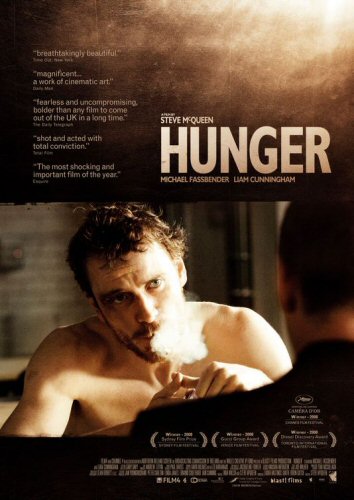
Tonight I watched the film Hunger for the second time since I got the DVD a couple of years ago. Hunger is one of few films about the 1981 hunger strike in the Maze prison in Ireland in which ten prisoners died. This particular film focuses on Bobby Sands, the leader of the hunger strike and the first to die. The film was released in 2008 and won numerous awards such as a BAFTA and other awards at film festivals like Cannes.
It's a very arty film. It doesn't follow a lot of the conventions of other films. For example, there is a sixteen and a half minute shot where the camera doesn't move at all and focuses entirely on a conversation between Sands and the prison chaplain. Other scenes are very visual and have no dialogue but a strong use of imagery instead. In the first ten or fifteen minutes of the film hardly a word is said but this is quite effective, I think. One of the first shots of the film shows a prison warder in his home in the morning dipping his hands into a sink full of water. He is clearly in pain at the time which evokes sympathy from the audience. A similar sequence is then repeated not long after however, this time his knuckles are bloody and bruised from having just beat up a number of prisoners.
I had a brief conversation with Harry about the film a few months ago in which she said she didn't like the film or its director Steve McQueen because she thought it glorified Sands and the hunger strikers. I don't really agree with this at all. The film is actually very unbiased, I find. It refuses to take sides and I think for the most part shows what actually happened without trying to glamourise or dilute the truth in any way.
As with any historical film, there will always be small inaccuracies and many of the characters are fictional representations. There is a scene where some of the prisoners are attending Mass in a communal area and all the while the priest is speaking the prisoners are all talking to each other over the top and drowning him out. This scene, I think, was included deliberately by McQueen to show that the conflict in Ireland is not a religious one and that although British propaganda paints it as a sectarian war, the IRA's war is against the British occupation of Ireland. However, factually, although a lot of prisoners were probably not deeply religious, scenes like the raucous behaviour at Mass wouldn't really have happened.
For me the film was a little short and lacking in a lot of detail about other events that were happening at the time. The fact that Sands was elected as a member of parliament during the time of his hunger strike is completely omitted from the film and the only mention of it is at the title cards at the end. The story itself seemed to lack quite a lot and at times it seemed like more of a graphical and artistic depiction of the conditions in the H-Blocks rather than a strong narratively driven film about the hunger strikes. The first time I watched it I can remember being quite surprised when it ended as it seemed to miss out so many important details and almost glaze over everything else that was happening during the hunger strike.
It's most certainly not a nice film to watch. In fact many parts are disgusting and brutal. It's not a film you would sit down and watch with the family and it's not really enjoyable viewing most of the time. However it is very well filmed and a lot of work went into it. Michael Fassbender for example, the actor who played Sands, went on a crash diet of ten weeks and lost about fourteen kilograms in order to make the film look truly authentic. Some of the images are quite shocking but this is intended of course and I think overall, Hunger does a good job of portraying the conditions of the H-Blocks in 1981.







